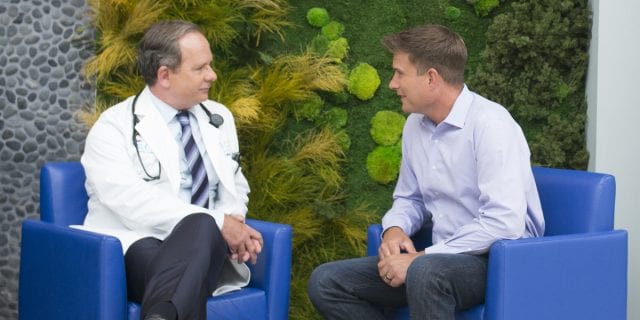Beyond Chemotherapy: Promising Results Seen with New Therapies for Lymphoma
Distinguished Lymphoma Program is Driving New Drug Therapies
A national authority in mantle cell lymphoma (MCL) research and clinical practice, John Theurer Cancer Center (JTCC) at Hackensack University Medical Center has been lead or co-lead in pivotal trials for all MCL drug therapies and has developed new prognostic markers in MCL.
Under the leadership of Andre Goy, M.D., Tatyana Feldman, MD, and Lori Leslie, M.D., the center operates the largest, most comprehensive lymphoma program in New Jersey.

Active work of JTCC investigators is allowing patients to move away from chemotherapy. Examples include:
- Based on the single agent activity seen with some new targeted therapies in aggressive B-cell lymphoma, the team combined Rituximab / Lenalidomide and Ibrutinib (R2Ib) as a form of immunotherapy without chemo (just biological targeted therapies) ) in older patients with relapsed or refractory aggressive lymphomas (particularly diffuse large cell lymphoma (DLBCL)) who cannot undergo high dose therapy and stem cell transplantation. Blood. 2019 Sep 26;134(13):1024-1036. doi: 10.1182/blood.2018891598. Epub 2019 Jul 22.
- For mantle cell lymphoma, the same combination with R2Ib was tested. Responses have been very durable, with some patients still in response after four years.
- For Hodgkin lymphoma, the new combination of Nivolumab (a checkpoint inhibitor) and Brentuximab Vedotin (BV) (an antibody drug conjugate) is being used as a frontline therapy to treat elderly Hodgkin patients without standard chemotherapy. Nivolumab for Newly Diagnosed Advanced-Stage Classic Hodgkin Lymphoma: Safety and Efficacy in the Phase II CheckMate 205 Study, J Clin Oncol. 2019 Aug.
- The team is also looking at integrating novel agents such Nivolumab and BV together with chemotherapy to limit the number of cycles of chemo received in advanced Hodgkin lymphoma.
- In Follicular lymphoma, the center was among the highest enrollers in the US for the RELEVANCE trial, looking at the comparison between standard chemotherapy versus rituximab and Lenalidomide (called R2) based on a rationale that lenalidomide as an immunomodulator could improve the activity of the well-established monoclonal antibody rituximab. This study established for the first time a chemotherapy-free option in follicular lymphoma patients as induction therapy, continuing to move the field away from standard chemotherapy.
- JTCC also has been involved in multiple studies looking at the real- world impact of these novel therapies particularly in MCL and CLL.
- The center was the first approved CAR T-cell program in New Jersey and has treated more than 80 CAR T-cell patients so far.
- The team is effectively treating chemotherapy-refractory diffuse large B-cell lymphoma and indolent B-cell malignancies with autologous T-cells expressing an anti-CD19 chimeric antigen receptor.
- Multiple studies are exploring novel options in mantle cell, CLL, marginal zone, follicular and large cell lymphoma. Some of these studies are looking at improving toxicity by preemptive use of steroids or tocilizumab (a drug to counteract the cytokines storm seen with CAR T-cells by blocking interleukin 6 effects with the monoclonal antibody against the IL6 receptor), or testing markers to predict toxicity and/or efficacy or finally test CAR T-cells in combination with some other small molecules to improve efficacy such as ibrutinib or lenalidomide or even checkpoint inhibitors to potentiate the efficacy and durability of CAR T-cells.
- JTCC is working with adaptive technology on minimal residual disease in lymphoma particularly in mantle cell lymphoma patients in order to refine the depth of complete response by quantifying minimal residual disease. This also allows for monitoring of patients with MCL and making any necessary adjustment of therapies.
- The team also working with Coop-Genomics in lymphoma to develop prognostic signatures to help refine treatments in all blood cancer by NEXT GEN sequencing looking at both DNA and RNA profiling.
